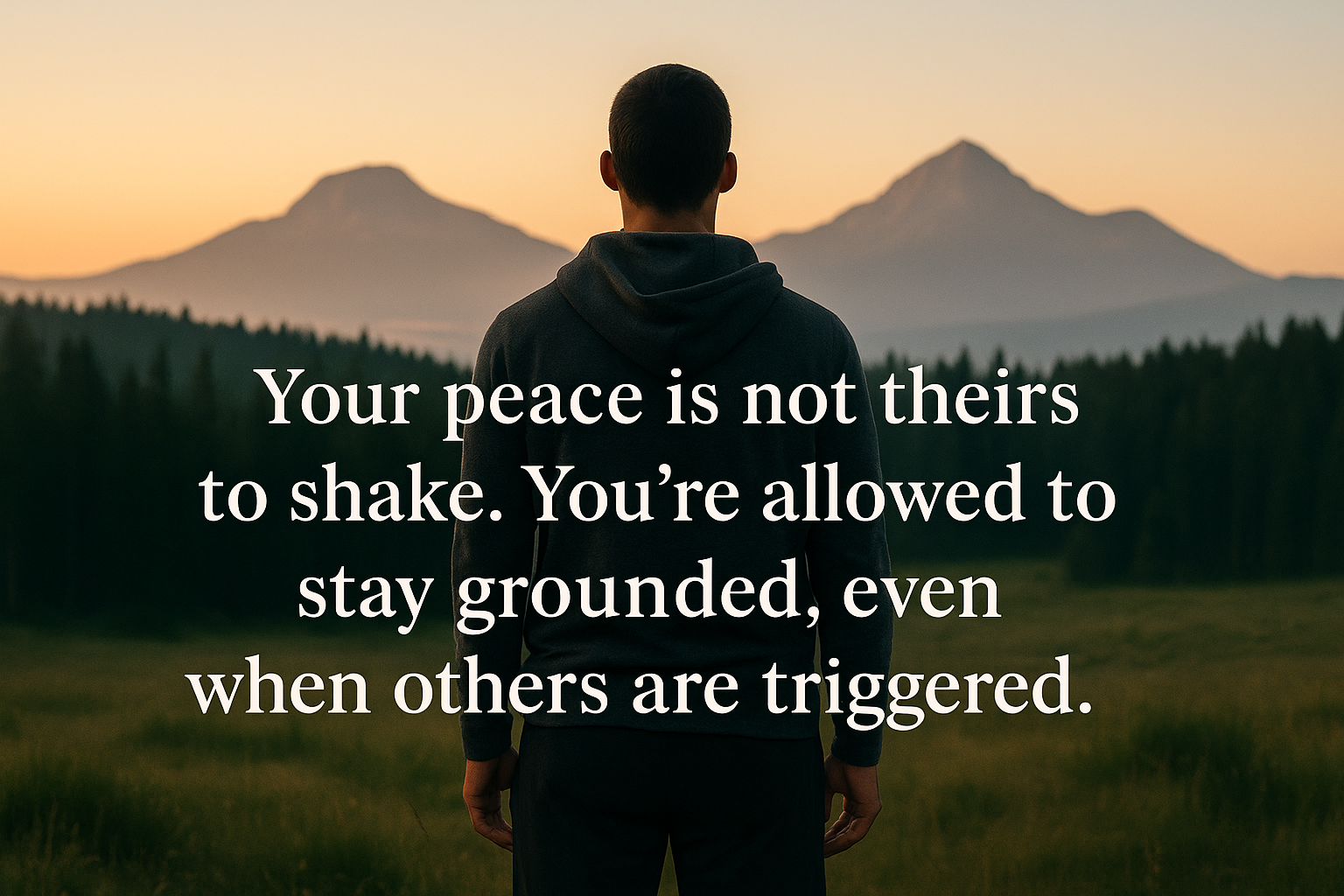How to Feel Emotionally Safe When Others Are Triggered

It’s hard to stay calm when someone around you is falling apart emotionally. Maybe they’re yelling, maybe they’re crying, maybe they’re shutting down. And even though it’s their reaction, it can start to feel like your problem.
This article will help you learn how to stay emotionally safe when other people are angry, sad, guilt-tripping you, judging you, or completely shutting you out. Think of it like building a calm bubble around yourself—even when everything outside feels intense.
🧠 First, Why Do People Get Triggered?
Being “triggered” means that someone’s brain has gone into fight, flight, freeze, or fawn mode—their nervous system thinks they’re in danger, even if the threat is emotional, not physical.
Triggers can come from:
Feeling disrespected or powerless
Being reminded of a past hurt
Being afraid they’ll be abandoned or rejected
Feeling like they’ve lost control
Important: When someone is triggered, they are in survival mode—not logical mode. That means you cannot fix it by explaining, arguing, or trying to please them. Your job is to take care of you first.
🚦Step-by-Step: How to Stay Emotionally Safe
🔍 Step 1:
Name What’s Happening
Example: “They’re triggered right now. This reaction isn’t about me—it’s about how they feel inside.”
Naming the moment puts you back in your thinking brain instead of reacting from emotion. Try this quietly to yourself:
“This is a trigger. I don’t have to join their storm.”
🧘 Step 2:
Ground Yourself
When someone else is dysregulated, your body might react too. Use grounding to help your nervous system feel safe.
Try:
5-4-3-2-1: Name 5 things you see, 4 you can touch, 3 you hear, 2 you smell, 1 you taste.
Breathe in for 4, hold for 4, out for 6.
Touch something cold (a metal water bottle, a countertop, a cool surface).
🛑 Step 3:
Check Your Boundaries
Ask yourself:
Am I responsible for their feelings? (No.)
Am I safe right now? (If not, leave or call for help.)
Can I stay present without absorbing their emotion?
Tip: You can care about someone without taking on their emotions.
😤 What to Do When They’re Angry
Example: A parent or friend starts yelling, slamming doors, or accusing you.
🛡️ Try this:
Don’t interrupt. Keep your face neutral and your body calm. You don’t need to respond right away.
Say: “I hear that you’re upset. I want to do this justice so I am going to step away and think about this. I’ll talk when we’re both calm.”
Walk away if needed: “I’m not in a place to talk when we’re yelling. I’ll come back when it’s safe.”
😢 What to Do When They’re Sad or Crying
Example: Someone’s tears make you feel like you have to fix it or comfort them.
🛡️ Try this:
Sit with them if you feel comfortable, but don’t force yourself to fix it.
Say: “I’m here with you, but I can’t carry this for you.”
Ground yourself if you start feeling overwhelmed by their emotion.
😔 What to Do When They Guilt You
Example: “After everything I’ve done for you, this is how you treat me?”
🛡️ Try this:
Pause and ask: “Is this really my responsibility, or are they trying to make me feel bad?”
Say: “I care about how you feel, but I’m not okay being guilted into things.”
Remind yourself: Guilt is not proof that you’re wrong.
😳 What to Do When They Shame or Judge You
Example: “You always make everything about you.” “You’re so selfish/lazy/stupid.”
🛡️ Try this:
Imagine putting a glass wall between you and their words.
Say: “I’m not okay with being spoken to like that.”
Use self-talk: “That’s their projection. I don’t have to take it in.”
🧊 What to Do When They Stonewall or Shut You Out
Example: They ignore you, give you the silent treatment, or act like you don’t exist.
🛡️ Try this:
Remind yourself: This is emotional withdrawal—it’s not your job to force connection.
Say: “I’m open to talk when you’re ready. I won’t chase you.”
Focus your energy on something grounding or creative—don’t spiral in anxiety.
💪 Final Thoughts: Your Emotional Safety Comes First
It’s okay to care about people. But it’s not okay to absorb their emotions or sacrifice your own well-being trying to manage theirs. You’re allowed to:
Step back
Protect your peace
Respond with calm instead of reaction
🧠 Bonus Practice: “Bubble of Safety” Visualization
Imagine a soft, clear bubble around you. Only kind, calm, or helpful energy gets in. Everything else stays outside the bubble. This is your boundary. You get to decide what enters your emotional space.
🧠 Bonus Practice: Imagine a Calm Anchor
Picture a moment when you felt calm, safe, or loved. Replay it like a mental movie.
You can also assign it a phrase:
“I’m grounded.”
“Peace stays with me.”
“Their storm isn’t my storm.”
Do this during or after any intense interaction.
